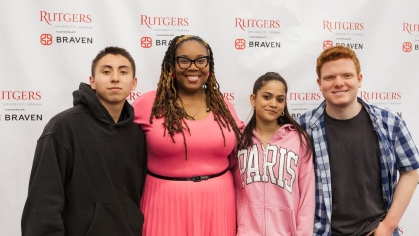The incoming class of 2024, the largest in the 78-year history of Rutgers-Newark, celebrated the start of their university journey at a convocation ceremony filled with music, dance, and words of welcome.
This year, Rutgers-Newark has 2,660 incoming students, including 70 percent who are first-year students and 30 percent who are transfer students. Nearly 40 percent are first-generation students, meaning the first in their families to attend college, while10 percent are from the city of Newark. Nearly 26 percent are from Essex County.
The theme of the ceremony was “Take Flight,’’ and speakers emphasized how a Rutgers-Newark education would prepare them to realize goals and dreams.
“You are here to learn to take flight every day by making this community your launch pad for your future,’’ said Interim Chancellor Jeffrey Robinson. “The first thing I want you to remember is that you absolutely don't have to do this journey alone. We are here to support you, we will help you – just ask.”
Robinson reassured students that even though the start of college can be intimidating, and they’ll have moments of doubt, they will build lasting friendships and a foundation that will prepare them for the future.
He shared memories of his first weeks as a first-year Rutgers student in the 1980s.
“I found myself in a sea of new people. I was trying to find people I could connect with. I found them--they were in the first student organization meeting I went to. And, I had no idea what to expect from these professors,’’ Robinson recounted. “The big question was, what was this journey going to be like?”
He told students that classmates he met his first year remain close friends. “We have attended one another’s weddings and been uncles and aunties to one another’s children; We have written books together; and we remain connected in ways that have helped me grow,’’ he said.
Newark Mayor Ras Baraka welcomed students to the city–”the largest, most diverse incredible city in the state of New Jersey.’’ He praised Rutgers-Newark as a microcosm of America and its potential.
“All the backgrounds, nationalities and religions, everything here in Rutgers-Newark is an example of what America looks like,’’ he said. “Sometimes we watch TV and we think we all live in separate places, so different and divisive. But if you come to Rutgers-Newark you should see what cooperation, what collaboration, what beauty, what America, what democracy, what education, should look like.’’
The mayor urged them to seize the moment of national political upheaval and harness it as a catalyst for change.
“Martin Luther King Jr. in his last speech said if he could be anywhere in the world, he was glad he lived in America during that time…despite how divisive and terrible times might have been,’’ said Baraka. “He was happy just be in those times because he could be an instrument of transforming society.’’
Rutgers-Newark Interim Provost Bonnie Veysey reminded students through her own story that higher education can broaden possibilities, even as circumstances and ambitions shift.
Veysey was raised in the Adirondack Mountains of upstate New York and briefly aspired to be a Catholic nun when she was young. But her path eventually led her to a position as dean of the School of Criminal Justice and other leadership roles before she was named provost this year.
“While you are on this journey, know that things may change. Things probably will change. You may go in a direction you never imagined,’’ she said. “But none of us ever gets to where we are going without others ... behind us, and in front of us, and beside us. Enjoy the ride!”
She asked students, “What’s your story? Where do you want to go?”
Robinson shared the stories of students from each school and college at Rutgers-Newark.
They included Miseka Diggs, a New Brunswick native and member of the Honors Living and Learning Community (HLLC), who is internationally known as an activist against the abuse of incarcerated women.
Another was Albert Chapusette, who transferred from Essex County College to Rutgers Business School, and ran his own company for several years while working in the Logistics and Transportation fields.
Amal Akkad Wattar, another transfer student and HLLC student who is attending the School of Arts and Sciences–Newark, fled the war in Syria and came to the United States for a better future.
Delia Leiva, a new student at the School of Public Affairs and Administration, is a three-time cancer survivor who transferred from Essex County Community College.
Katelyn Baxter, a Criminal Justice major, worked full-time to support herself and her brothers but found academic success in the Educational Opportunity Fund Summer Program.
Student speakers included Student Governing Association President Wardah Samad
and student speaker Daniela Ovelar. The ceremony also featured performances by Zawadi African Dance & Drum and a flash mob of student dancers, including members of Rutgers Ehsas and RU-N Dance, in addition to Rutgers-Newark cheerleaders who helped build school spirit.



